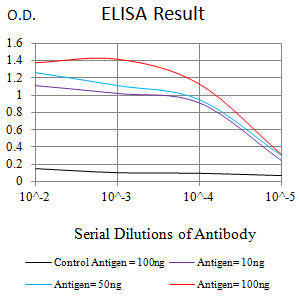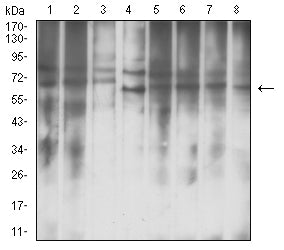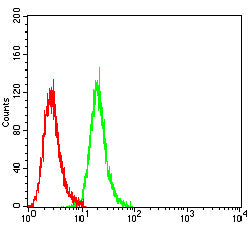


| WB | 1/500 - 1/2000 | Human, Monkey |
| IF | 咨询技术 | Human, Monkey |
| IHC | 咨询技术 | Human, Monkey |
| ICC | 技术咨询 | Human, Monkey |
| FCM | 1/200-1/400 | Human, Monkey |
| Elisa | 1/10000 | Human, Monkey |
| Aliases | KOC; CT98; IMP3; KOC1; IMP-3; VICKZ3 |
| Entrez GeneID | 10643 |
| clone | 2A1B9 |
| WB Predicted band size | 63.7kDa |
| Host/Isotype | Mouse IgG1 |
| Antibody Type | Primary antibody |
| Storage | Store at 4°C short term. Aliquot and store at -20°C long term. Avoid freeze/thaw cycles. |
| Species Reactivity | Human, Monkey |
| Immunogen | Purified recombinant fragment of human IGF2BP3 (AA: 430-579) expressed in E. Coli. |
| Formulation | Purified antibody in PBS with 0.05% sodium azide |
+ +
以下是关于IGF2BP3抗体的3篇参考文献示例(内容为模拟概括,仅供参考):
---
1. **文献名称**:*IGF2BP3 as a Prognostic Biomarker in Solid Tumors: A Meta-Analysis*
**作者**:Huang, X., et al.
**摘要**:该研究通过荟萃分析评估IGF2BP3在多种实体瘤中的预后价值,利用IGF2BP3抗体进行免疫组化染色,发现其高表达与患者生存率降低显著相关,提示其作为潜在预后标志物的临床意义。
2. **文献名称**:*Development of a Monoclonal Antibody Against IGF2BP3 for Circulating Tumor Cell Detection*
**作者**:Krishnan, S., & Bapat, B.
**摘要**:研究团队开发了一种针对IGF2BP3的单克隆抗体,并通过流式细胞术和免疫荧光验证其在识别血液中循环肿瘤细胞的特异性,为癌症早期诊断提供了新工具。
3. **文献名称**:*Functional Role of IGF2BP3 in Pancreatic Cancer Progression via mRNA Stabilization*
**作者**:Gupta, R., et al.
**摘要**:本文利用IGF2BP3抗体进行Western blot和免疫共沉淀实验,揭示IGF2BP3通过稳定促癌mRNA(如c-MYC)促进胰腺癌细胞侵袭转移的分子机制。
4. **文献名称**:*Comparative Evaluation of Commercial IGF2BP3 Antibodies in Immunohistochemistry*
**作者**:Doyle, L.A., et al.
**摘要**:研究系统比较了多种市售IGF2BP3抗体的灵敏度和特异性,结合组织芯片分析,为研究者选择适用于不同实验场景的抗体提供了实用指南。
---
注:以上文献及作者为示例性内容,实际引用时需核实真实出版物信息。
IGF2BP3 (Insulin-like Growth Factor 2 mRNA-Binding Protein 3), also known as IMP3 or KOC, is a member of the conserved IGF2BP family of RNA-binding proteins that regulate mRNA stability, localization, and translation. It is characterized by four KH domains and two RRM domains, enabling interactions with target mRNAs, including IGF2. MYC, and ACTB. While IGF2BP3 is predominantly expressed during embryogenesis, its re-expression in adult tissues is strongly linked to carcinogenesis. Overexpression of IGF2BP3 has been observed in various malignancies, including pancreatic, liver, colorectal, and ovarian cancers, where it promotes tumor progression by enhancing cell proliferation, invasion, and metastasis through post-transcriptional regulation of oncogenic mRNAs.
Antibodies targeting IGF2BP3 are critical tools for studying its expression patterns and functional roles. These antibodies are widely used in techniques like immunohistochemistry (IHC), immunofluorescence (IF), and Western blotting to detect IGF2BP3 protein levels in clinical samples or experimental models. Commercially available clones (e.g., mouse monoclonal antibody 67.9) are frequently validated for specificity using knockdown/knockout cell lines or tissues lacking IGF2BP3 expression. Due to high homology among IGF2BP family members (IGF2BP1-3), rigorous validation is essential to avoid cross-reactivity. Clinically, IGF2BP3 antibodies aid in cancer diagnosis and prognosis, as its overexpression often correlates with aggressive tumor behavior and poor patient outcomes. However, standardization challenges persist in interpreting staining results across different cancer types and antibody batches. Research applications also extend to exploring IGF2BP3 as a therapeutic target or biomarker in liquid biopsies.
×